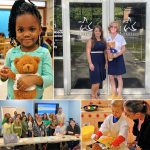The Kids Count Data book provides population data on all children across the United States from birth to age 17. Michigan is home to 650,317 children under the age of five. 20% of those children reside in Wayne County, the largest population of young children across the entire state. In the 2024 Kids Count report, which covers through 2022, there is striking data regarding Michigan’s youngest and most vulnerable children: The statistics above demonstrate the critical need for diverse programming that supports infants, toddlers, preschoolers and their families. The first five years of a child’s life are the most critical due to rapid brain development. These early years lay the foundation for future educational, relational, and life-long success. Early childhood professionals from all disciplines work tirelessly to educate, support, and empower families with young children to mitigate the risks and increase positive outcomes. At Starfish, we support early … [Read more...]
A Fresh Start: How Starfish Family Services Supports Families at the Start of the School Year
By: Marisa Nicely, Chief Operating Officer At Starfish Family Services we love the month of September and especially the first day of school. There is something incredibly special about the beginning of a new school year. Everyone in our organization is excited about new challenges and endless opportunities. As the lead of programs here at Starfish, I see this time of year as an opportunity to celebrate, evaluate, and ensure we are offering the most relevant, comprehensive, and quality services to our families. Our early childhood centers prepare all summer long to welcome back our young learners. Teachers, center employees and the early education team are always excited to welcome new and returning families to our classrooms. It’s a wonderful experience to see children coming to school for the very first time and to watch preschoolers eagerly greet their teachers and friends. Our team is out in full force to welcome, and sometimes comfort, both the children and … [Read more...]
Celebrating the Success of SEEDing for College at Marygrove Early Education Center
At Marygrove Early Education Center, we are thrilled to announce the success of our SEEDing for College program, a groundbreaking pilot initiative launched in partnership with Wayne Metro Community Action Agency. This program is a vital step toward empowering our students and their families to prepare for the financial aspects of attending college, and we are proud to share the impact it has had on our community. About SEEDing for College: Empowering Futures SEEDing for College was designed with one primary goal: to equip students with the financial knowledge and tools they need to confidently pursue higher education. The program offers a comprehensive approach, focusing on helping students and their families navigate the often complex processes of making bank deposits, securing financial aid, and planning for college expenses. Through a combination of workshops, counseling sessions, financial literacy education, and our unique Deposit Days, students received hands-on experience … [Read more...]
Pajama Program
Read the full article on Livonia Today here Every child benefits from a good night’s sleep and Pajama Program makes that happen for many.The nonprofit national organization provides pajamas for newborns to 10-year-old children, and even teddy bears and books to promote and support a comforting bedtime routine and healthy sleep habits that could benefit people the rest of their lives. Everything that is donated to children is new.Research shows that children who follow a bedtime routine are more likely to get the healthy sleep they need to thrive and feel secure. The bedtime routine promotes parent and child bonding and helps children fall asleep, stay asleep and wake up refreshed. Good sleeping habits pave the way for good health and emotional well-being.The organization provides new pajamas, bears and storybooks, as well as health education programs about the importance of sleep among children and their families. The books that are donated also promote literacy and a love for … [Read more...]
Emmauel Israel Hired as Center Leader at the Hiveley Early Childhood Education Center
Emmanuel Israel was recently hired as Center Leader at our Hiveley Early Childhood Education Center. With close to 10 years of experience in early childhood education, and male/father engagement, he brings a wealth of knowledge and experience. Emmanuel Israel, BSc (Psych), IECMH-E received a Bachelor of Science Degree in Psychology from Bellevue University and is attending Eastern Michigan University to obtain a Master of Arts in Early Childhood Education. Also, he has earned the MI-AIMH Early Childhood Mental Health Endorsement® as an Early Childhood Family Associate! He is the FIRST African American Professional to earn this new Endorsement and the FIRST male professional to earn this Endorsement! His Starfish journey began in 2014 as a parent and was hired in 2015 as a Father Engagement Specialist. Since, he’s held positions as Disability Assistant, Family Service Guide, Teacher, Education Coach and now Center Leader. Prior to coming to Starfish Family … [Read more...]
- « Previous Page
- 1
- 2
- 3
- 4
- …
- 19
- Next Page »




